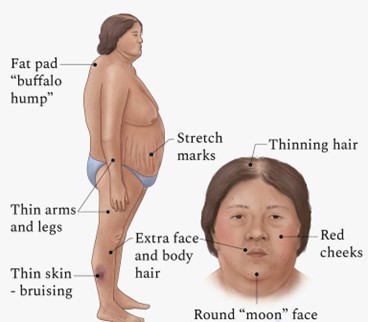A nurse is caring for a client who is experiencing an acute exacerbation of ulcerative colitis. The nurse should recognize that which of the following actions is the priority?
Provide emotional support.
Evaluate fluid and electrolyte levels.
Promote physical mobility.
Review stress factors that can cause disease exacerbation
The Correct Answer is B
Choice A reason: Providing emotional support is important for a client who has ulcerative colitis, as the condition can affect their quality of life and mental health. However, this is not the priority action for a nurse who is caring for a client who is experiencing an acute exacerbation of ulcerative colitis, as it does not address the immediate physical needs of the client.
Choice B reason: Evaluating fluid and electrolyte levels is the priority action for a nurse who is caring for a client who is experiencing an acute exacerbation of ulcerative colitis, as the client is at risk of dehydration, hypovolemia, and electrolyte imbalances due to diarrhea, vomiting, and poor oral intake. The nurse should monitor the client’s vital signs, urine output, weight, skin turgor, mucous membranes, and laboratory values such as serum sodium, potassium, chloride, bicarbonate, blood urea nitrogen (BUN), and creatinine.
Choice C reason: Promoting physical mobility is beneficial for a client who has ulcerative colitis, as it can help prevent complications such as deep vein thrombosis (DVT), pulmonary embolism (PE), and pressure ulcers. However, this is not the priority action for a nurse who is caring for a client who is experiencing an acute exacerbation of ulcerative colitis, as the client may have abdominal pain, fatigue, and weakness that limit their mobility. The nurse should encourage rest and provide comfort measures such as positioning, heat therapy, and analgesics.
Choice D reason: Reviewing stress factors that can cause disease exacerbation is helpful for a client who has ulcerative colitis, as stress can trigger or worsen inflammation in the bowel. However, this is not the priority action for a nurse who is caring for a client who is experiencing an acute exacerbation of ulcerative colitis, as it does not address the immediate physical needs of the client. The nurse should teach the client about stress management techniques and refer them to appropriate resources such as counseling or support groups.
Nursing Test Bank
Naxlex Comprehensive Predictor Exams
Related Questions
Correct Answer is C
Explanation
Choice A reason: Weight loss is not a symptom of Cushing’s syndrome. On the contrary, weight gain and obesity are common signs of this condition, especially in the trunk, face and upper back1.
Choice B reason: Diaphoresis, or excessive sweating, is not a symptom of Cushing’s syndrome. It can be caused by other conditions, such as hyperthyroidism, menopause or anxiety.
Choice C reason: Hyperpigmentation, or darkening of the skin, is a symptom of Cushing’s syndrome. It occurs due to increased production of melanin, the pigment that gives color to the skin. Hyperpigmentation can affect any part of the body, but it is more noticeable in areas exposed to friction or pressure, such as the elbows, knees, knuckles and armpits.
Choice D reason: Hypotension, or low blood pressure, is not a symptom of Cushing’s syndrome. In fact, high blood pressure (hypertension) is one of the common symptoms of this condition, due to the effects of cortisol on the cardiovascular system.

Correct Answer is ["A","B","D"]
Explanation
Choice A reason: Documenting the color, consistency, and amount of nasogastric drainage is an important action for the nurse to include in the client’s plan of care. This can help monitor the client’s GI function, fluid balance, and response to treatment. The normal color of nasogastric drainage is clear or yellow-green. Abnormal colors include red, brown, or black, which may indicate bleeding.
Choice B reason: Encouraging hourly use of an incentive spirometer while awake is an important action for the nurse to include in the client’s plan of care. This can help prevent respiratory complications, such as atelectasis and pneumonia, which are common after abdominal surgery. An incentive spirometer is a device that helps the client breathe deeply and expand the lungs.
Choice C reason: Irrigating the nasogastric tube every 4 to 8 hr is not an action that the nurse should include in the client’s plan of care. Routine irrigation of nasogastric tubes is not recommended, as it may increase the risk of infection, tube occlusion, or aspiration. Irrigation should only be done when indicated by specific orders or protocols, or when there is evidence of tube blockage.
Choice D reason: Performing leg exercises every 2 hr is an important action for the nurse to include in the client’s plan of care. This can help prevent venous thromboembolism (VTE), which is a serious complication that can occur after surgery due to immobility and hypercoagulability. Leg exercises can improve blood circulation and reduce stasis in the lower extremities.
Whether you are a student looking to ace your exams or a practicing nurse seeking to enhance your expertise , our nursing education contents will empower you with the confidence and competence to make a difference in the lives of patients and become a respected leader in the healthcare field.
Visit Naxlex, invest in your future and unlock endless possibilities with our unparalleled nursing education contents today
Report Wrong Answer on the Current Question
Do you disagree with the answer? If yes, what is your expected answer? Explain.
Kindly be descriptive with the issue you are facing.
